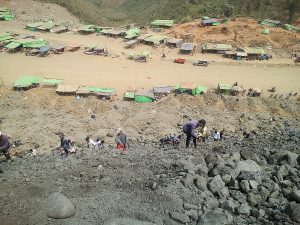Following the February 1 military coup in Myanmar, residents of Yangon, the country’s commercial capital, have described a return to the practices of the “bad old days,” the decades during which the military ruled the country with an iron fist: informants listening into conversations in tea shops, angling for dissidents; journalists hiding in safe houses, reporting under pseudonyms; the economy closing in on itself as Myanmar becomes increasingly isolated from the rest of the world.
In the jade mines of Kachin State, in the far north, the coup has turned the established political economy upside down. The current situation feels more like “the bad new days,” as one jade merchant recently told me.
For decades, Hpakant, the center of the Myanmar jade mining industry, has been a place where opposing sides of Myanmar’s long-running civil war came together more-or-less peaceably to make enormous sums of money. Where the “Green Vein” of jade flowed, the fighting stopped. But since the coup, the Kachin Independence Army (KIA), one of the country’s oldest and most well-organized armed groups, has engaged in repeated violent clashes against the Tatmadaw, as the Myanmar military is known, fighting for control over jade and other natural resources in the northern mountains.
The jade industry has been both a cause and a consequence of violence in northern Myanmar for many years. Enormous amounts of money are at stake. The jade industry has been valued at anywhere between $8 and $40 billion per year, providing the Tatmadaw and armed groups a flood of untraceable money. The KIA and the Tatmadaw have fought a low-temperature war in the region since 2011. Illegal jade profits have long funded both groups.
While the civilian government under Aung San Suu Kyi had attempted (not very successfully) to reform the jade industry from 2016 to 2020, since the February 1 coup, the Tatmadaw has been able to take a far more controlling stake in Hpakant’s jade operations. As a new report by Global Witness explains, that control has given the Tatmadaw the power to portion out new mining licenses and ramp up jade production. The resulting profits will undoubtedly line the pockets of the generals that lead the military.
That shifting dynamic explains in part why in the last four months, fighting has been particularly fierce between the KIA and the Tatmadaw in Hpakant township and across Kachin State in general – an effort by both parties to physically secure as much of the mining territory as possible and assert more control over the political economy of the far north.
The illicit, underground nature of most of the jade trade makes it nearly impossible to accurately report on. What is clear is that whoever can pull jade out of the ground is basically guaranteed a major windfall. Smuggling the gemstone to China is notoriously simple across the porous northern border. A high-quality piece of jade can be carried across in a backpack and fetch millions of dollars in the Chinese markets. Both the KIA and the Tatmadaw control and profit from taxing these smuggling routes. The untraceable, ungoverned nature of jade makes it a perfect vehicle for off-book military funding and patronage politics.
The same is true for Myanmar’s other underground economies, including methamphetamine production, the opium trade, illegal timber harvesting, and large human trafficking networks. While shutdowns in 2020 related to COVID-19 slowed down some of these businesses, they still pump large quantities of untracked, untaxed foreign currency into the country. Effectively under the regime’s control, these industries will provide a crucial economic lifeline to top generals. Even as the Tatmadaw’s holding companies are sanctioned by the international community, the Green Vein and other financial streams will allow patronage networks to survive, the generals to remain effectively insulated from any exogenous shocks, and soldiers to maintain their elite status as distinct from the rest of Myanmar’s population.
For the residents of Kachin State, the fallout from the February coup has made life more precarious and violent. As I have reported in the past, Kachin’s civilian population, especially the itinerant miners that gravitate to Hpakant, bear a disproportionate amount of the suffering that arises from the jade industry and the civil war around it. Since February, that level of human suffering has only gotten worse. One miner I spoke with in June said that since the coup, police and military have beefed up their presence, and there have been more violent security incidents in the jade mining towns.
Another miner said that as Tatmadaw-affiliated companies have moved since February to aggressively limit ethnic Kachin itinerant miners from accessing certain mining areas, many such miners have left Hpakant to try and find work in some of the new mining sites that are cropping up along the northern border with China. Local newspaper the Irrawaddy has reported that since the coup, more than 100 new small-scale rare earth mines have begun production in areas controlled by Tatmadaw-affiliated militias. The ammonium sulphate and other materials that come out of these mines are part of the 35,000 tons of rare earth minerals that Myanmar exports to China each year. Local environmental groups claim that production in these mines lacks any oversight, has polluted the soil and waterways of more than 20 villages, and led to a “rampage” of illegal digging.
The coup provided the necessary cover for the KIA and the Tatmadaw to fight over control of the Green Vein, which may be the most valuable single resource in the country. But as the rush to exploit rare earth minerals along the northern border shows, spoils are up for grabs across the country. As Myanmar’s political elites battle for control over the country’s natural resources and the enormous profits that come with them, those on the ground will continue to pay the steepest price.
If nothing changes, then the “bad new days” will be here to stay.

































